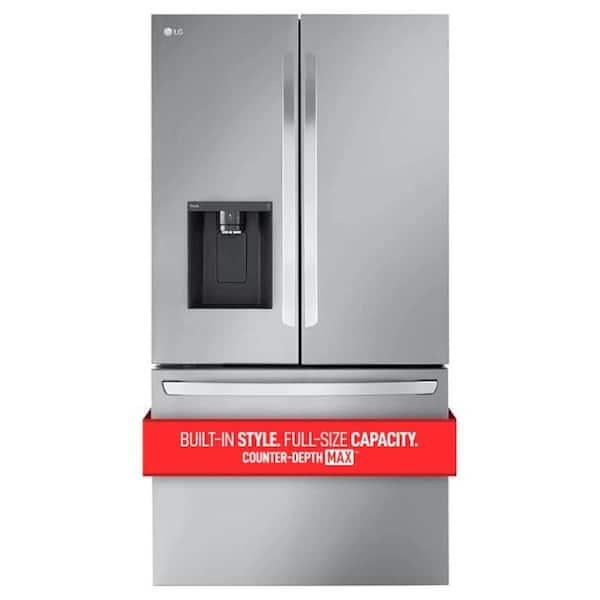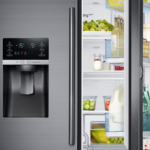Yes, a fridge can catch fire. Both mini and full-sized refrigerators pose fire hazards under certain conditions.

Refrigerators, including mini and full-sized models, can be fire hazards due to electrical malfunctions or overheating components. Faulty wiring, damaged power cords, or malfunctioning compressors can ignite flammable materials inside or near the appliance. Regular maintenance and proper usage reduce these risks significantly.
Ensuring the fridge is on a dedicated electrical circuit and away from heat sources is crucial. Unplugging the fridge when not in use for extended periods also helps prevent potential fires. Understanding these risks and taking preventive measures ensures safety and prolongs the appliance’s lifespan. Always be vigilant about unusual noises or overheating signs from your refrigerator.
Introduction To Fridge Fire Risks
Understanding the risks associated with fridge fires is crucial. Both mini and full-sized refrigerators can pose fire hazards. It’s important to identify common causes and potential consequences.
Common Causes
Refrigerator fires often start due to electrical issues. Faulty wiring and damaged power cords are common culprits. Overloading power outlets can also lead to fires.
- Faulty wiring
- Damaged power cords
- Overloaded power outlets
Another risk is poor maintenance. Dust buildup in the coils can cause overheating. Unmaintained compressors may also overheat and catch fire.
- Dust buildup in coils
- Unmaintained compressors
Potential Consequences
Fridge fires can cause extensive property damage. The fire can spread to nearby furniture and appliances. This may result in significant financial loss.
Another consequence is the risk to human life. Fires can produce harmful smoke and fumes. These can be dangerous if inhaled.
| Consequences | Details |
|---|---|
| Property Damage | Fire spreads to other items |
| Financial Loss | Cost of repairs and replacements |
| Risk to Human Life | Harmful smoke and fumes |
Understanding these risks helps in taking preventive measures. Regular maintenance and careful use of electrical outlets are key steps. Always ensure your fridge is in good working condition.

Credit: www.homedepot.com
Electrical Issues
Many people don’t think about their fridge catching fire. But, electrical issues can make it happen. Both mini and full-sized refrigerators have risks. This section focuses on electrical problems. We’ll look at faulty wiring and overloaded circuits in detail.
Faulty Wiring
Faulty wiring is a big problem. Wires can wear out over time. Old wires may become exposed. This can cause sparks. Sparks can start a fire.
Even new fridges can have faulty wiring. If wires are not installed right, they can cause issues. Look at the back of your fridge. Check for frayed or loose wires. If you see any, call a professional.
| Signs of Faulty Wiring | Actions to Take |
|---|---|
| Frayed Wires | Call an electrician |
| Sparks | Unplug the fridge |
| Burning Smell | Turn off power |
Overloaded Circuits
Overloaded circuits are another risk. Plugging too many devices into one outlet can cause this. Your fridge needs a lot of power. If the circuit is overloaded, it can trip the breaker. Worse, it can cause a fire.
Use a dedicated outlet for your fridge. Avoid using extension cords. They can overheat. This increases the risk of fire.
Here’s a checklist to avoid overloaded circuits:
- Use a dedicated outlet
- Check the circuit breaker
- Avoid extension cords
Keeping these points in mind can keep your home safe.
Component Failures
Understanding the risks of a fridge catching fire involves knowing about component failures. Both mini and full-sized refrigerators have parts that can fail. These failures can lead to dangerous situations, including fires.
Compressor Malfunctions
The compressor is a critical part of any refrigerator. It circulates refrigerant through the cooling system. A malfunctioning compressor can overheat. This overheating can cause the unit to catch fire. Signs of a faulty compressor include strange noises and reduced cooling efficiency.
Regular maintenance can help prevent compressor failures. Here are some tips:
- Clean the coils regularly to ensure proper airflow.
- Check for refrigerant leaks and fix them promptly.
- Ensure the compressor has enough ventilation space.
Cooling System Breakdowns
Another common issue is the cooling system breaking down. This system includes various components like the evaporator and condenser coils. If any part of this system fails, it can lead to overheating. Overheating components are a fire hazard.
Watch for these signs of cooling system problems:
- Frost buildup inside the fridge.
- Unusual warm spots in the fridge.
- Constantly running fridge motor.
Regular checks and timely repairs can keep the cooling system in good shape.

Credit: www.amazon.com
Flammable Materials
Refrigerators can sometimes catch fire due to flammable materials.
These materials can cause serious risks if not managed properly.
Both mini and full-sized fridges have their own set of hazards.
Insulation Risks
The insulation in fridges can be flammable.
Some fridges have polyurethane foam insulation.
This foam can catch fire if exposed to high heat.
Older fridges may have dangerous insulation.
These materials can ignite more easily.
Regularly check for updates and recalls.
Stored Items
Items stored inside the fridge can also pose risks.
Aerosol cans and flammable liquids should never be stored in fridges.
These items can explode if they get too cold or hot.
Food containers made of certain plastics can melt.
This can cause fires if the fridge malfunctions.
| Flammable Material | Risk |
|---|---|
| Polyurethane Foam | High flammability |
| Aerosol Cans | Explosive risk |
| Flammable Liquids | Explosive risk |
| Plastic Containers | Melting and fire risk |
Mini Vs Full-sized Refrigerators
Refrigerators are essential in every household. But should you choose a mini or a full-sized model? Each has its benefits and potential risks, especially concerning fire hazards. Let’s explore these differences to help you make an informed decision.
Size And Space Considerations
Mini refrigerators are small and compact. They fit in tight spaces like dorm rooms or small apartments. Full-sized refrigerators, on the other hand, are much larger. They need more room and often come with more features. Here’s a comparison:
| Type | Dimensions | Ideal For |
|---|---|---|
| Mini Refrigerator | 18-24 inches wide | Small spaces |
| Full-Sized Refrigerator | 30-36 inches wide | Family kitchens |
Mini fridges are great for limited spaces. Full-sized fridges offer more storage and features.
Power Consumption Differences
Power consumption varies greatly between mini and full-sized refrigerators. Mini fridges generally consume less power. They are designed for smaller loads. Full-sized refrigerators, however, use more power. They have larger compressors and more advanced features.
- Mini Refrigerator: Uses around 100-250 kWh per year.
- Full-Sized Refrigerator: Uses around 300-800 kWh per year.
Higher power consumption can sometimes lead to overheating, which may increase fire risks. Always ensure proper maintenance and ventilation.
Preventative Measures
Understanding how to prevent fridge fires is crucial. By following simple measures, you can keep your home safe. Here are key steps to ensure your fridge operates safely.
Regular Maintenance
Regular maintenance helps prevent potential fire hazards. Here are some maintenance tips:
- Clean the coils: Dust and dirt can clog coils.
- Inspect the wiring: Look for frayed or damaged wires.
- Check the seals: Ensure the door seals tightly.
Regular cleaning and inspection reduce fire risks.
Proper Installation
Proper installation is key to preventing fires. Follow these guidelines:
- Place the fridge away from heat sources: Keep it away from stoves and ovens.
- Ensure proper ventilation: Allow space around the fridge for air circulation.
- Use the correct power source: Ensure the outlet matches the fridge’s power requirements.
Correct installation ensures safe operation of your fridge.
By following these preventative measures, you can reduce the risk of fridge fires. Regular maintenance and proper installation are key to a safe home.
Safety Features
Refrigerators, whether mini or full-sized, come with various safety features. These features help prevent fire hazards. Understanding these features can keep your home safe.
Built-in Protections
Modern refrigerators have many built-in protections. These include:
- Temperature Control: Ensures the fridge does not overheat.
- Overload Protection: Prevents electrical overloads that can cause fires.
- Auto Shut-off: Turns off the fridge if it detects a problem.
These built-in features are crucial for safety. They help reduce the risk of fires.
Aftermarket Add-ons
In addition to built-in protections, you can use aftermarket add-ons. These provide extra safety:
- Fire Extinguishers: Keep one near the fridge for quick access.
- Surge Protectors: Prevent electrical surges that can cause fires.
- Smoke Detectors: Alert you to any fire hazards early.
These add-ons can enhance your refrigerator’s safety. They are easy to install and use.
| Feature | Description |
|---|---|
| Temperature Control | Keeps the fridge from overheating |
| Overload Protection | Prevents electrical overloads |
| Auto Shut-off | Shuts off the fridge if there is a problem |
Both built-in protections and aftermarket add-ons are vital. They help ensure your fridge does not catch fire. Keep your refrigerator maintained and safe!
Emergency Response
Understanding how to respond during a refrigerator fire can save lives. Every second counts. Acting quickly and calmly is essential. Here’s how to handle such emergencies.
Steps To Take
- Turn off the power: Unplug the fridge immediately. This stops electricity from feeding the fire.
- Use a fire extinguisher: Grab a fire extinguisher rated for electrical fires. Aim at the base of the flames.
- Evacuate the area: If the fire grows, leave the house. Your safety is the priority.
- Call emergency services: Dial 911 as soon as you’re safe. Inform them about the fire.
- Prevent spread: Close doors to contain the fire. This helps prevent it from spreading.
When To Call Professionals
Not all fires can be handled alone. Know when to call for help:
- Fire is too large: If it’s bigger than a small trash can, call professionals.
- Smoke is thick: Thick smoke means the fire is dangerous. Evacuate and call 911.
- Fridge damage: If unsure about the damage extent, get an electrician. They can inspect for hidden issues.
- Persistent odors: If burnt smells linger, seek professional cleaning. They ensure safety and cleanliness.
Always prioritize safety. Quick and informed actions can prevent tragedy.

Credit: www.amazon.com
Frequently Asked Questions
What Are the Chances of a Mini Fridge Catching Fire?
The chances of a mini fridge catching fire are low. Ensure proper usage and maintenance to minimize risks. Regularly check for damaged cords and overheating issues.
Is It Safe to Leave a Mini Fridge on Overnight?
Yes, leaving a mini fridge on overnight is safe. Ensure proper ventilation to prevent overheating. Regular maintenance boosts safety.
What Causes a Fridge to Catch Fire?
Faulty wiring, overheating compressors, or damaged power cords can cause a fridge to catch fire. Regular maintenance helps prevent risks.
What Appliance is Most Likely to Catch Fire?
The most likely appliance to catch fire is the kitchen stove. Other high-risk appliances include dryers, microwaves, and toasters. Always ensure proper maintenance to reduce fire risk.
Conclusion
Understanding refrigerator fire risks is essential for safety. Regular maintenance reduces hazards. Both mini and full-sized fridges need care. Prioritize safety and prevent potential fires. Always follow manufacturer guidelines. Safety measures ensure peace of mind and protect your home from fire dangers.
Stay informed and keep your fridge in good condition.


GIPHY App Key not set. Please check settings